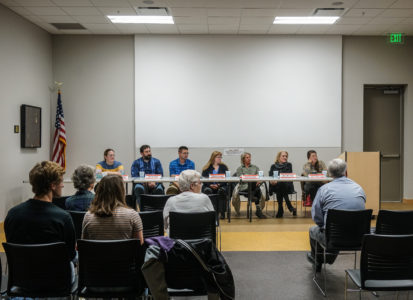
On Tuesday, Nov. 5, Grinnell residents will go to the polls to decide who will represent them in the local offices of mayor, city council and school board. However, voters are not given much of a choice in candidate, as all races field unopposed incumbents.
Many local offices are up for election this year, including the mayor, a city council at large seat, as well as the city council wards 2 and 4, and one school board at large seat, as well as school board districts 3 and 4. The mayor serves a two-year term, and the city councilors and school board members all serve four-year terms.
School board candidates and current members met for a forum in Drake Community Library on Wednesday, Oct. 30 to publicly discuss their races and issues facing the school district. When asked whether or not the lack of opposition in the municipal elections raises any concerns, they acknowledge several problems with the situation, as well as potential benefits.
Barbara Brown is not up for election this year but is currently serving her third term on the school board. She said that the lack of opposition “says something about the comfort level in general people have with the district and town and how we’re operating,” referencing past elections where, “there has been a lot more divisiveness around school issues, and there have been a lot more people opposing seats.” Brown said the elections this year are, “reflective of a better place we’re in now than we have been in the past.”
Dustin Smith, a candidate for school board district 4, said he was “happy to have the cohesiveness of a group where we’ve been working together, we know each other well.” However, he also said that, “having dissenting voices is not a bad thing,” especially in regard to the bond vote to build a new school building that failed. Smith said that it might be helpful “having a voice or two on the board” to “hear that side of the story.” He said that “It’s easier to oppose something than it is to be part of the solution. I wish there was more people being part of that solution,” but people don’t necessarily have to run for office for those views to be heard. Smith added that, “At most of our board meetings, no one is in attendance, so we do the best we can.”
Professor Steve Sieck, chemistry, is also a candidate for school board district at large. He said, “My concern with it is just the lack of engagement it suggests within our community in lots of different ways, meaning going to meetings, volunteering in some way or the other, coming to these types of sessions, just being civically engaged.” At a forum with less than 10 members of the community, this seems like a reasonable concern. However, Sieck says this problem affects more than just Grinnell’s school board, citing that engagement “seems to be more and more of a challenge through all levels, throughout our community, and all levels of local politics, as well as across the state and nationally.”
Despite low turnout at the forum, school board members answered questions with knowledge and passion about issues facing the Grinnell-Newburg Community School District. Voting will be held next week on Nov. 5.


























































